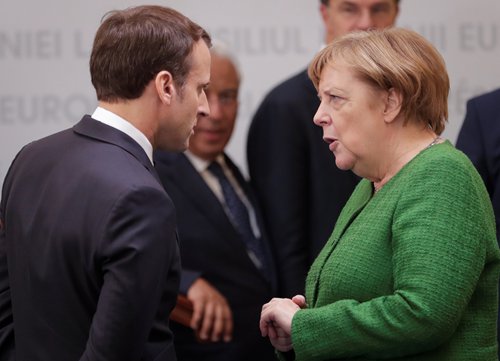HOME >> OPINION
Europe’s future lies in Eurasian integration
By Xia Guohan Source:Global Times Published: 2019/5/28 19:08:42

Photo: VCG
German Chancellor Angela Merkel said in a recent interview that the old certainties of the postwar order no longer apply and Europe must reposition itself to stand up to the challenges posed by China, Russia and the US. Merkel's remarks reflect Germany's insecurity and strategic confusion as it confronts internal and external situations.
At the regional level, triggered by Brexit, internal contradictions of the EU have broken out. First, within the EU, the balance of power will be altered by Britain's departure. This will result in a leadership struggle between Germany and France, with the focus shifting from the economy to security.
Second, after populist parties seize power in countries like Italy and Austria, Euroskepticism will be revived. Member states' inclination to separate from the EU will grow stronger. Under the circumstances, it is more difficult for the EU to carry out reforms.
Third, influenced by the Trump administration's "America First" policy and its unilateral global trade war, the EU's strategic decision will become more uncertain. It is possible that the US will impose tariffs on European automobiles, or use Nord Stream 2 as an excuse to slap sanctions on the EU, smearing EU-Russia relations. The US is also likely to launch military action against Iran, which may bring geopolitical disaster to the Middle East. All the above will seriously affect the overall security of the EU.
At the global level, the world order is undergoing historic structural changes. Although Europe does have advantages, its lack of strategic sensitivity may prevent it from making strategic adjustments in time. First, after the Cold War, the world pattern has seen a change from unipolarity to bipolarity. In the future, the world will become multi-polarized with the US and China retaining primacy. In the unipolar system, non-hegemonic countries tended to become appendages of the hegemonic power, while in the bipolar system, they would form a third pole group under the guidance of nonalignment, so as to restrict the superpowers and benefit from both sides. The EU and Eurozone have a third pole group nature and this can be taken advantage of. That's why French President Emmanuel Macron repeatedly advocated Europe's security independence and called for a European army which apparently would weaken NATO's role.
Moreover, facing a new round of competition for territorial and maritime rights, Europe has to get involved in the Eurasian integration with a new geo-strategic position. The old geopolitical barriers have gradually been removed by technology development. And with the promotion of the China-proposed Belt and Road Initiative, a world centered on the interconnected "World Island" has begun to take shape.
Such trends conform to the advancement of human civilization. In this new map, Eurasia serves as the main geopolitical plate in the "World Island," with Southeast Asia, Australia, Africa and the Arctic being the four sub-geographical plates. The North American continent acts as an extraterritorial partner.
In terms of civilization, Europe detaches from Asia. However, geographically, Europe is a sub-region in western Eurasia. Europe and China encompass areas that are contiguous to both land and sea. Whether Europe's maritime strategy of "Atlantic Alliance" will evolve into the sea-land strategy of connecting Europe and Asia will have a profound impact on its future strategic choices.
Last, the battle to lead the fourth industrial revolution has begun. The US' relentless suppression of Huawei's 5G is a typical example. The first and second industrial revolutions made Britain an empire "on which the sun never sets." America's rise as the world's hegemon was attributed to the second and third industrial revolutions. Similarly, those who grasp the historical opportunity of the fourth industrial revolution are very likely to become the leading force in the 21st century.
Different from the previous three industrial revolutions featuring a single technology breakthrough, the fourth industrial revolution will be driven by a series of new technologies and their application to markets, such as clean energy, new materials, life engineering, artificial intelligence, new connectivity (5G, internet of everything). Even if the US can independently lead the technological innovation in the fourth industrial revolution, it will fail to be the major market for commercial applications of new technologies due to its limited population.
The first industrial revolution saw millions of people working in factories. The second industrial revolution involved tens of millions, the third hundreds of millions and now the fourth industrial revolution will affect billions of people. Correspondingly, a larger market is needed to absorb technology consumer products. Only an interconnected World Island can meet the above requirements.
In the race of the new industrial revolution, the EU lags behind China and the US, at least in 5G communication. If the EU can't lead in technical standards, it is supposed to actively participate in Eurasian integration to build the future market. The EU has to decide.
The author is a research fellow with The Charhar Institute. opinion@globaltimes.com.cn
Posted in: VIEWPOINT